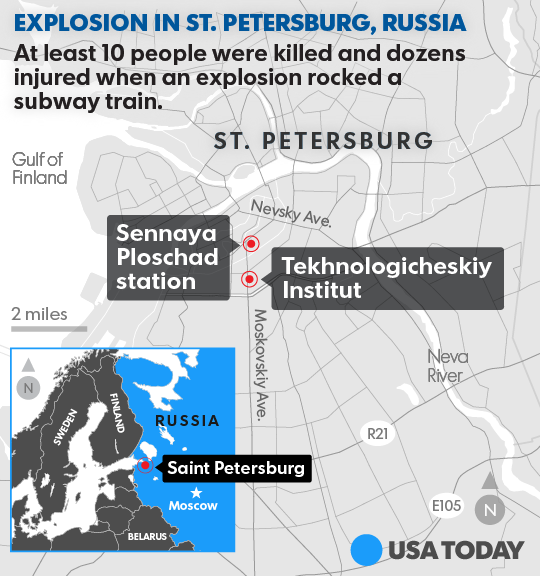Mourning, alarm in Russia after deadly blast in St. Petersburg

A bomb blast in a St. Petersburg subway train Monday killed 11 people, injured dozens more and sent Russian authorities scrambling to increase security at transportation hubs across the nation.
A second bomb laden with shrapnel was later diffused at a busy subway station, Interfax reported, raising fears the threat was not over. Earlier, the news agency reported that a manhunt was underway for two suspects. Later Monday, the news agency cited unnamed sources and reported that police believe the blast was the work of a suicide bomber tied to radical Islamists.
President Vladimir Putin, who was visiting Russia's second-largest city at the time, offered condolences to the families of the victims and promised a quick and thorough investigation.
"Law enforcement agencies and special services ... will do everything to provide a full assessment on what has happened," Putin said.
President Trump spoke with Putin and condemned the attack, the White House said in a statement.
"President Trump expressed his deepest condolences to the victims and their loved ones, and to the Russian people," the statement read. "President Trump offered the full support of the United States Government in responding to the attack and bringing those responsible to justice. Both President Trump and President Putin agreed that terrorism must be decisively and quickly defeated."
Metro stations across the city were evacuated following the mid-afternoon blast. Photos and video posted on social media from the scene showed a smoke-filled platform, a damaged subway train and people lying on the ground.
The National Anti-Terrorism Committee said the blast appeared to be caused by "an unidentified explosive device." Aleksandr Bastrykin, head of Russia's Investigative Committee, said an act of terrorism was suspected.
Subway attacks: Terrorists have targeted rail before
The city's system serves about 2 million riders per day. The explosion took place near the Sennaya Ploshchad station, but the train continued on to the Technological Institute station. Bastrykin said the train's driver saved lives by keeping the train moving to the platform, allowing for a prompt evacuation.
St. Petersburg resident Leonid Chaika was nearby when the blast occurred.
“I saw a lot of smoke, a crowd making its way to the escalators, people with blood ... on their clothes, bloody faces," she told Reuters. "Many were crying."
Authorities ordered tightened security at the nation's critical transport facilities. Security was increased in Moscow's subway system, which carries more than 9 million riders per day, and the Federal Air Transport Agency said airlines and airports also were taking additional measures.
Russia is no stranger to subway attacks. Terrorist strikes in Moscow's transit system in 2004 and 2010 each killed at least 40 people. Both attacks were linked to Chechnyan rebels. No one immediately claimed responsibility for Monday's blast.

The Russian health ministry initially put the death toll at 10, but the anti-terrorism committee later said 11 had died. The city declared three days of mourning.
President Trump, asked about the incident, noted that such attacks are happening "all over the world. Absolutely a terrible thing." The U.S. Mission Russia issued a statement expressing condolences and urging U.S. citizens in the city to contact loved ones to notify them that they are safe.
Charles Michel, the prime minister of Belgium, offered condolences on Twitter. Brussels was victimized by coordinated attacks on its subway and airport a year ago that killed more than 30 people. "Another beautiful city becomes a place of mourning. My thoughts and condolences go out to the victims and their families #SaintPetersburg" Michel tweeted.
Anthony Roman, a global risk-management expert and president of Roman & Assoc. in Lynbrook, N.Y., told USA TODAY that based on pictures of the damaged train with the doors blown out and scarring on the walls, the blast seemed to occur inside the car.
“We’re still in the fog of war here,” Roman said.
Roman’s firm observed Russian security first-hand for transportation during the Sochi Olympics and found it "wholly inadequate." But he said that subways and other train systems are difficult to protect from terrorists because of the large number of people using them.
The investigation of the blast will immediately focus on interviewing witnesses, gathering evidence from the scene and studying shrapnel from the explosive to determine what it was and how it was made, Roman said.
“This might not be the end of it,” Roman added. “The next week or so could be a high-risk period.”
Contributing: Bart Jansen, David Jackson
